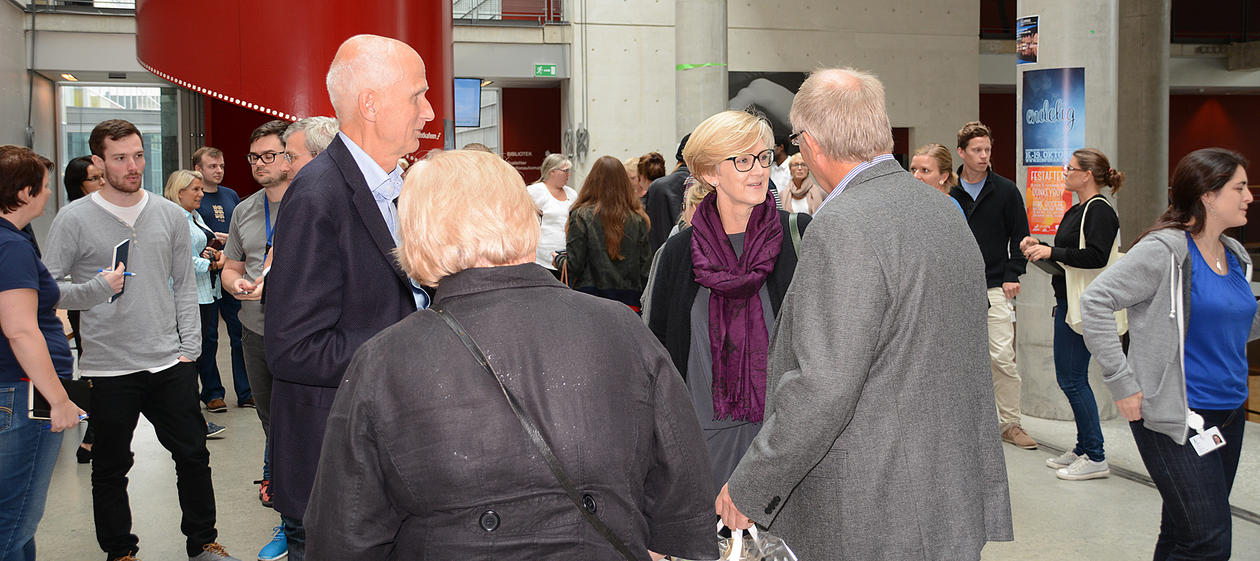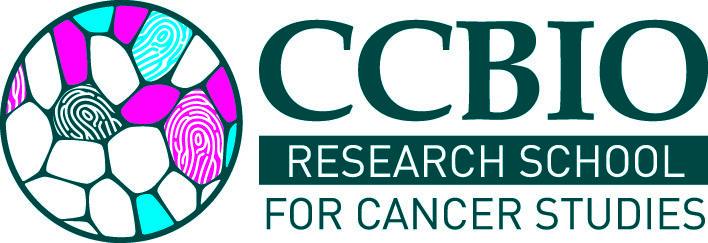The CCBIO Research School for Cancer Studies
The CCBIO Research School for Cancer Studies (RSCS), which was officially opened in September 2014, focuses on translational cancer research and innovation, including international exchange and mobility as well as ethical-, legal- and societal aspects of cancer research and treatment. The research school courses are available for all interested students within the field of cancer research. The RSCS is currently directed by Agnete Engelsen and Erling Høivik.

Hovedinnhold
Main goals and activities
In accordance with its aims, the RSCS is now well established as a scientifically stimulating and inclusive meeting place for junior researchers within various areas of cancer research and related ELSA fields with a common focus on translational studies of cancer biomarkers. PhD candidates and postdocs have an opportunity to meet each other and deliberate upon their research projects across the established research groups and disciplines. CCBIO has successfully integrated the RSCS into its strategic activities like the CCBIO Annual Symposium, CCBIO Junior Scientist Symposia and CCBIO Seminars. In conjunction with lectures and seminars, CCBIO makes sure to use the opportunity for both young and senior researchers to have targeted meetings with the invited speakers where potential points of common interest are mapped out. In combination with CCBIO’s strategy of inviting external speakers also for the other courses and its recruitment of an international network of adjunct positions, this ensures that the center’s younger researchers have access to renowned national and international researchers from outside CCBIO.
Courses currently running
All courses are open according to available capacity, albeit giving CCBIO´s PhD candidates first right of entry in case of capacity problems. The below list CCBIO Research School for Cancer Studies denotes CCBIO’s courses approved by the UiB. The courses will run once a year or every second year, apart from CCBIO901 and CCBIO902 which run continuously.
CCBIO 901- CCBIO Junior Scientist Symposium. PhDs and PDs present their results four times a year. Postdocs are chairing the meeting and discussions after each presentation. Find more information here.
- CCBIO 902 CCBIO Seminar and Symposium Series. This course combines the monthly CCBIO Seminar series with the CCBIO Annual Symposium to make a 3 point 900-level course.
- CCBIO 903 Cancer Research: Ethical, economical and societal aspects. This 5 ECTS course focuses on ethical, economical and societal aspects of cancer and cancer research and aims to equip PhD candidates with tools for systematic reflection on their own and related research as well as methods for assessing the cost benefit of health measures and methods of treatment. Such knowledge is not only important on a personal level as a researcher, but also in funding proposals to be able to clarify any ethical issues related to the implementation of projects, and be better equipped to provide an explanation of how such issues will be dealt with. Read earlier article: CCBIO focusses on Ethics and Prioritization in new PhD course.
- CCBIO 904 Biomarkers and Tumor Biology in Clinical Practice. This 4 ECTS course covers tumor biological aspects important for the understanding of why cancer develops and which mechanisms are important for tumor growth, metastases and morbidity in patients. It focuses especially on tumor biological changes that may have or already have significance for personalized cancer treatment and clinical trial studies of new diagnostics and treatment. The next course will be May 29-31, 2024.
- CCBIO 905 Methods in Cancer Biomarker Research. This 5 ECTS course has focus on the full panel of advanced and standard methods with relevance for cancer biomarkers. The intention is a methodological course that also includes components of ethics and economy. This is a strongly needed course with potential national interest. The last times this course was held was September 27-29, 2022. Next time is not yet announced.
- CCBIO 906 Cancer Genomics. This 3 ECTS course provides broad understanding of aspects of cancer genome biology and their investigation by next generation sequencing (NGS) technologies. Methods for analysing DNA variation and structure and RNA expression patterns are covered, as well as nuclear and chromatin structure. Also ethical, legal aspects, and hereditary predisposition are taught. This course started up in 2017, and was held the first time November 1-3 2017. Last time was October 23-26, 2023. Next time is not yet announced.
- CCBIO 907 Cancer-Related Vascular Biology. Thorough understanding of general and cancer-related vascular biology is regarded important to understand processes like cancer growth, sustainability and progression, and is suggested to be a relevant target for therapy in various diseases. Through this new (2018) 2-week 6 ECTS course set up as part of the CCBIO/Harvard INTPART partnership between the Vascular Biology Program at Boston Children's Hospital and CCBIO, the students will meet researchers who have been in the frontline of vascular biology research for decades. Some of the topics covered: Basics of vascular biology; vascular biology related therapeutic approaches; biomarkers in vascular biology – from discovery to clinical application; lymphangiogenesis and vascular biology in non-cancerous diseases. The most recent courses were held 21. September - 2. October 2020, as a digital course and March 20–31, 2023. Next time is not yet announced.
- CCBIO908 Scientific Writing and Communication Seminar. The 2 ECTS course aims to provide the students with theoretical knowledge about various elements of scientific writing, practical experience on text editing, and provide the students with tools to improve their scientific texts, and communicate orally research results in a good way. The course is intended to convey understanding of how to organize a scientific manuscript, how to improve on all parts of the text, including clear writing, and how to write an informative and convincing cover letter. The course will also present and discuss what is good research communication. The course first started up in 2017 and was repeated in 2019, as a two-day seminar in Scientific Writing in the CCBIO/Harvard INTPART collaboration. From 2020, it has been approved as a PhD course providing 2 ECTS. The most recent course was May 22-23, 2023. Next time is May 21-22, 2024.
- BMED 904 Biomedical Research Course: Matrix Biology. BMED904 is a 3 ECTS well-established course from the Bergen Biomedical Research School (BBRS) that has been included into CCBIO’s course portfolio. The course was arranged jointly with CCBIO’s RSCS for the first time in June 2015. BMED904 is a five day course that includes lectures from local researchers and a number of internationally well-known researchers within the field of matrix biology as well as practical laboratory training. The course focuses on basic molecular mechanisms pertaining to the biological role of the extracellular matrix. The last BMED904 was held June 07-11, 2021. Next time is not yet announced.
- CCBIONEUR910 Patient and Public Involvement in Medical and Health Research. This 2 ECTS course aims to inspire increased user participation in research trials and will present methods on how to involve user representatives. This is highly relevant to all biomedical research fields, and Patient and Public Involvement is documented to positively impact the relevance and efficacy in medical research. The main objective of the course is to develop the participants’ capacity to assess and convey the value of patient and public involvement in general, as well as promoting productive user involvement in their own research projects. The course spans over 3 days (last time November 3-5, 2021), and combines plenary discussions and group sessions involving user representatives and patient organizations, with presentations from national and international lecturers. The most recent course was Nov. 30 - Dec. 2, 2022. Next time is April 17–19, 2024.
- CCBIONEUR911 Clinical Trials. The completed program qualifies for a Good Clinical Practice (GCP) certificate and covers several aspects of clinical trials – from design planning to execution – with learning examples from cancer research and neurological research alike. This 2 ECTS course go through topics such as study design, the pharmaceutical company perspective, the patient's perspective, ethics, GCP overiview and concepts, practical running of a clinical trial, formalities and regulations, writing a protocol, applications and funding, contracts, translational research protocols, clinical trials as part of normal clinical operations, success factors and clinical trials in the future. The most recent course was in January 2024.
- CCBIONEUR912 Health Innovation. This 4 ECTS course aims to teach PhD candidates and other researchers how to recognize the close connection between research findings and innovation potential. The course will use examples from our own research environments as well as internationally, to showcase the practical route from idea to patent – and beyond. The overall aim of this course is to encourage and enable our PhD students and young researchers to identify and evaluate the innovation potential in their own research projects, and provide them with the knowledge needed to be able to do this. The course will provide inspiration and practical knowledge on alternative ways to realize the innovation potential from research projects. The last was held November 8-9 and December 2-3, 2021, at campus Haukeland University Hospital. Next time is not yet announced.

